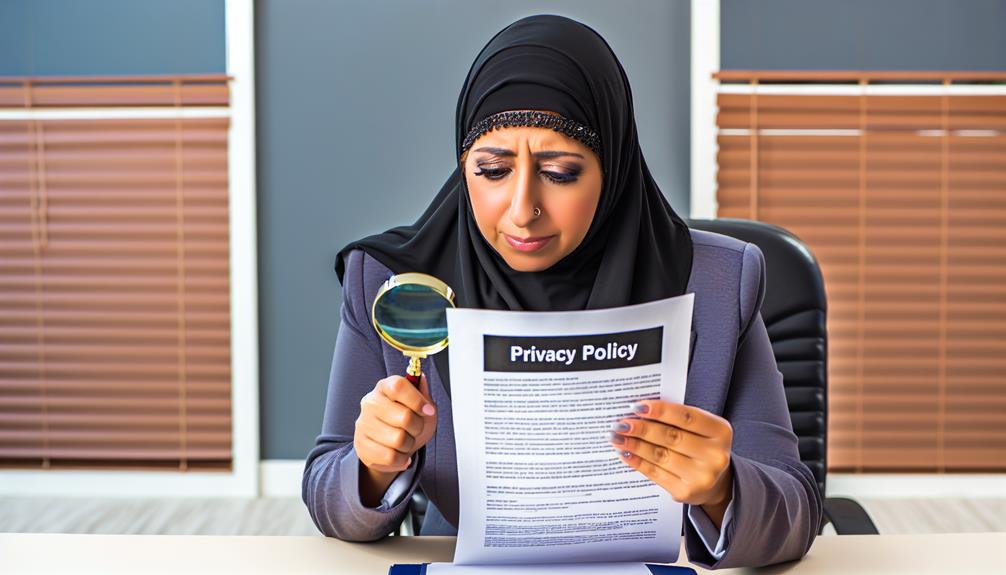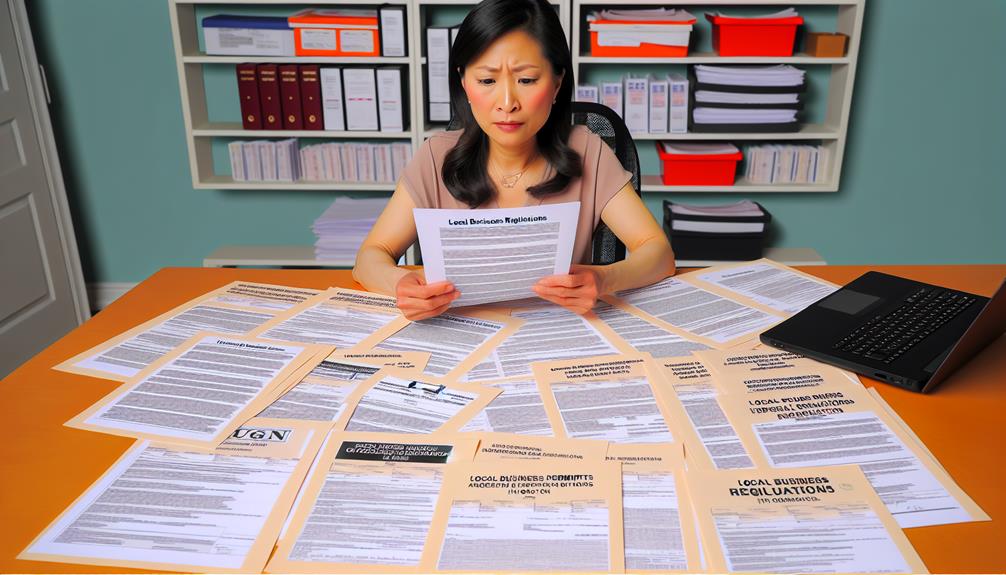Hey there, fellow small business owner in Houston! Keeping up with regulations is a must for your company's success and longevity. Let me share 10 crucial tips to help you navigate the regulatory landscape smoothly.
From taxes to insurance, each detail is vital for your business's seamless operation. Stick around to learn how these tips can steer you away from potential issues and ensure your business thrives in Houston's competitive market.
Tax Compliance
To keep your small business running smoothly in Houston, it's crucial to stay on top of tax obligations. Houston businesses must pay sales tax on items like goods, services, and property rentals.
If your revenue hits a certain level, you'll also need to file and pay the Texas franchise tax. Understanding federal income tax rules, which can vary based on your business structure, is key.
Don't forget about Houston's property tax system to avoid any penalties. And if you're selling taxable goods or services in the city, make sure to register for a sales tax permit.
Labor Laws
Ensuring you meet minimum wage requirements and grasp overtime regulations is crucial in Houston to steer clear of penalties. These labor laws play a vital role in safeguarding your employees' rights and well-being.
Stay current with the latest guidelines to foster a safe and equitable workplace environment. It's not just about compliance; it's about creating a supportive and fair setting for your team.
Minimum Wage Requirements
Hey there, small business owners in Houston! Did you know that you need to follow the Fair Labor Standards Act (FLSA) when it comes to paying your employees? The current minimum wage set by the federal government is $7.25 per hour, and it's crucial to make sure all your employees are paid at least this amount for every hour they work.
While the federal minimum wage is $7.25 per hour, keep in mind that certain industries in Houston might have their own specific minimum wage requirements that go above this standard. Failing to comply with these rules can result in some serious consequences like fines, penalties, and even legal trouble. It's essential to stay up to date with the minimum wage regulations in Houston to steer clear of any violations and the headaches that come with them.
Overtime Regulations
As a small business owner in Houston, it's crucial to make sure your employees are fairly compensated for their hard work. In Houston, employees who work more than 40 hours in a week are entitled to 1.5 times their regular pay for those extra hours. This rule helps protect workers and ensures they're compensated fairly for their efforts.
It's important to be aware of the distinction between exempt and non-exempt employees to determine who's eligible for overtime pay. Violating these regulations can result in serious consequences, such as having to pay back wages to employees. Keeping accurate records of employee hours is key to staying compliant with these overtime rules.
Antitrust Regulations

Antitrust regulations in Houston are serious about preventing unfair practices like price fixing and market domination. These rules aim to maintain a level playing field in the marketplace and stop shady business tactics that could harm consumers or other companies.
If a business breaks these laws, they could face hefty fines and legal trouble. To steer clear of these consequences and stay on the right side of ethics, it's crucial for businesses to follow these regulations to the letter.
For small businesses in Houston, understanding and obeying antitrust laws is key to ethical and sustainable operations. By playing by the rules, companies help create a fair business environment locally and earn trust from customers and partners.
Advertising Guidelines
Crafting advertisements in Houston requires strict adherence to honesty and truthfulness guidelines to avoid legal entanglements. It's crucial to comply with advertising laws to sidestep penalties and promote fair competition. Houston upholds stringent regulations on health claims, environmental advertising, and testimonial validation to safeguard consumers and maintain ethical standards. Deceptive marketing practices are strictly prohibited in Houston to protect the interests of both consumers and businesses.
To help you navigate Houston's advertising landscape effectively, here are some practical tips:
- Stay Tax Compliant: Ensure that your advertisements accurately reflect any tax implications related to your products or services to avoid legal issues and misrepresentation.
- Verify Health Claims: Double-check the validity of health claims to align with Houston's regulations on truthful advertising, protecting consumers and upholding ethical standards.
- Avoid Deceptive Tactics: Steer clear of deceptive marketing practices to uphold fair competition, safeguard your business reputation, and maintain consumer trust.
Email Marketing Laws

When it comes to email marketing laws, it's crucial for businesses to play by the rules to avoid legal troubles. Here are some key points to remember:
- Before hitting send on any commercial emails, make sure you have the recipient's consent.
- The CAN-SPAM Act requires that your marketing emails include a way for people to opt-out easily.
- Be upfront about who you're when sending emails and always provide a valid physical address.
If you stray from these rules by using shady subject lines or misleading content, you could face hefty fines and harm your business's reputation. By sticking to these guidelines, not only do you follow the law, but you also earn trust with your customers and steer clear of penalties from authorities like the Internal Revenue Service.
Environmental Compliance
Ensuring the sustainability and success of your small business in Houston hinges on one key factor: staying in line with environmental regulations. These rules aren't just paperwork; they're crucial for keeping our city clean and safe. By following federal waste disposal laws, businesses like yours play a vital role in safeguarding our environment from harm.
When companies operate within these boundaries, we prevent pollution and protect our natural resources. It's not just about avoiding fines and legal trouble—though those can hit hard—it's about doing our part to preserve our surroundings for future generations.
Privacy Regulations

In Houston, it's crucial for businesses to protect customer data to comply with privacy regulations and ensure data security. This not only builds trust with customers but also helps steer clear of legal troubles.
To navigate privacy laws effectively, consider these practical tips:
- Encrypt Data: Safeguard sensitive customer information through encryption to thwart unauthorized access.
- Control Access: Set up stringent access controls to restrict who can handle and view customer data.
- Conduct Regular Security Checks: Routinely audit your data security measures to catch and fix any weaknesses promptly.
Licensing & Permits
When starting a business in Houston, it's crucial to have the right licenses and permits in place. Not having the necessary paperwork can lead to legal issues and disrupt your operations.
Stay on top of the licensing and permitting requirements to keep your business running smoothly within Houston's regulations. Remember, compliance is key to avoiding any unnecessary hurdles down the road.
Required Licenses
Running a small business in Houston means diving into the world of licenses and permits. To stay on the right side of city rules, it's crucial to nail down the specific paperwork your industry demands.
Different Houston businesses call for different licenses, whether you're in food service, construction, or healthcare.
The permits you'll need hinge on the kind of business you run within Houston's city limits.
Each license application in Houston comes with its own set of steps, costs, and renewal guidelines.
Getting the right licenses and permits is key to dodging fines, penalties, or worse, having your business shut down. Do your homework to keep things legit in Houston.
Permit Application Process
So, you're diving into the world of permits in Houston?
It's crucial to do your homework and really grasp what licenses your business needs, especially if you're a solo entrepreneur. Take the time to understand the application process, fees, and all the necessary paperwork for each permit.
To stay on the right side of the law, make sure your applications are spot on and complete. Keep track of renewal deadlines to avoid any hiccups in your business flow.
If you hit a bump along the way, don't shy away from seeking help from the City of Houston's Permitting Center or Small Business Development Office.
Compliance Inspections
In Houston, businesses have to jump through hoops to make sure they're up to snuff with all the licensing and permit requirements. This means facing in-depth inspections to check if they're following zoning laws, health codes, and safety regulations.
These inspections cover a range of areas like fire safety, building codes, and signage rules to keep everything on the up and up. Passing these checks is crucial to staying on the right side of the law and keeping operations running smoothly. If a business falls short during an inspection, it could mean facing fines, temporary closure, or even legal trouble. It's a high-stakes game that no business wants to lose.
Insurance Requirements
As a small business owner in Houston, it's crucial to make sure you're on top of your game when it comes to insurance requirements. You want to protect your business, comply with the law, and have peace of mind in case the unexpected happens. Here's a look at the key types of insurance you should consider for your Houston small business:
- General Liability Insurance: This coverage is like a safety net for third-party claims that could come your way.
- Professional Liability Insurance: It's your shield against claims of errors or negligence in your line of work.
- Workers' Compensation Insurance: This one's a must-have to take care of your employees in case of injuries on the job.
Pay Data Reporting

To comply with Houston's regulations, large businesses need to report pay data by job category, gender, race, and ethnicity under the Pay Data Reporting requirement. This reporting plays a vital role in addressing wage gaps and promoting fairness in the workplace. The Equal Employment Opportunity Commission (EEOC) uses this data to effectively enforce anti-discrimination laws.
Here are some key steps to follow:
- Organize pay data accurately based on job categories, gender, race, and ethnicity.
- Submit the pay data to the EEOC by the annual deadline of March 31.
- Failure to meet these reporting requirements in Houston can result in penalties and legal consequences, impacting your business operations and potentially leading to federal tax issues.
It's crucial to stay on top of these reporting obligations to ensure compliance and promote a more equitable work environment.
Frequently Asked Questions
What Are the Common Rules Needed to Effectively Manage a Small Business 10 Marks?
When running a small business, it's crucial to have a good grasp of federal, state, and local regulations. You need to stay on top of tax laws, labor regulations, and licensing requirements to stay compliant. Make sure to follow sound financial practices, keep meticulous records, and don't hesitate to seek guidance from professionals when it comes to navigating legal obligations. It's all part of the game in managing a successful business venture.
What Area of Regulations Are Small Businesses Likely to Have Problems With Compliance?
Running a small business comes with its fair share of hurdles, from navigating tax and labor regulations to staying on top of marketing strategies, data protection, and licensing requirements. It's crucial to grasp these rules and regulations to steer clear of any legal troubles down the road.
Do I Need an EIN or a Sales Tax Permit in Texas?
Hey there! If you're looking to set up shop in Texas, make sure to get your hands on an EIN and a sales tax permit. An EIN is like your business's social security number, crucial for taxes and hiring folks. And that sales tax permit? It's your ticket to staying on the right side of the state's tax rules. The good news is you can snag both online for free. So, get those ducks in a row, and you'll be all set to rock in the Lone Star State!
Do I Need a Permit to Build a Shed in Houston?
Hey there, if you're looking to put up a shed in Houston that's larger than 200 square feet, it's important to get a permit. Ignoring this requirement could result in fines and legal issues down the road. Make sure to get your permit from the Department of Public Works and Engineering to stay on the right side of the law.
